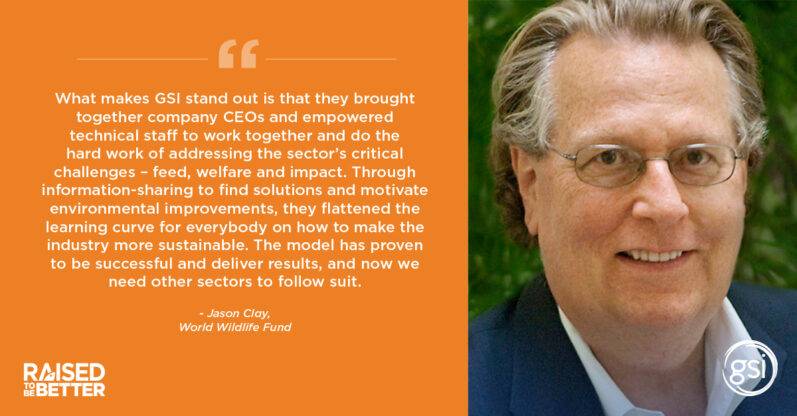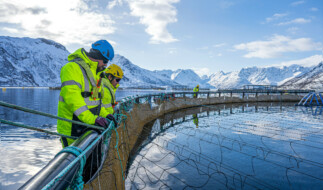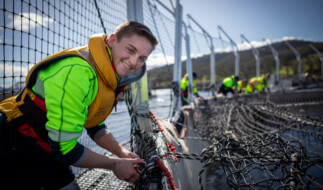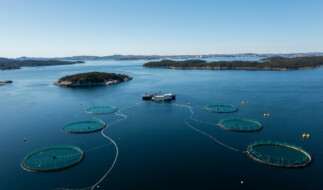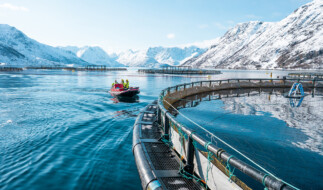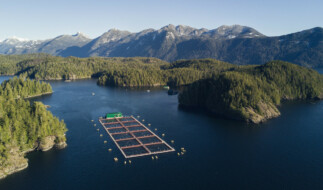8th Annual GSI Sustainability Report: Driving Environmental Improvements and Producing Farmed Salmon That’s Raised to Be Better
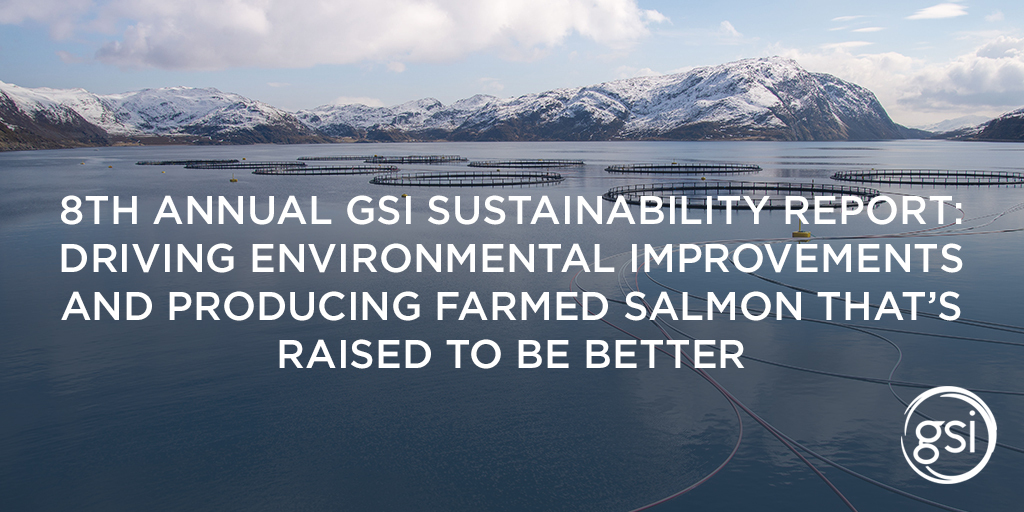
Sustainability reports are no longer unique in the corporate world – and that’s beneficial for us all. Organizations like each of our member companies are expected to report on their environmental impact and ongoing efforts to improve it. However, GSI’s Sustainability Report – released today – is unique because it’s really for our members before anyone else.
Providing company level data across each of our 13 member’s operating regions and across 14 indicators – 10 environmental and 4 social – the report’s findings enable us, as GSI, to compare results, identify where greater progress is needed, and use the GSI platform to find and implement solutions for continuous improvement.
In addition, we have chosen to keep our metrics aligned with the Aquaculture Stewardship Council (ASC) Standard, widely recognized as the most rigorous of standards, to allow for consistency in reporting.
The report is a catalyst for motivating improvements, and GSI’s platform helps members drive these improvements at speed and scale. With our membership representing 40% of the farmed salmon supply chain, we have an unparalleled ability to ensure more people can enjoy healthy, responsibly raised salmon. We share our results annually and publicly for transparency and as part of our leadership role in supporting more resilient food systems and the communities where our members operate.
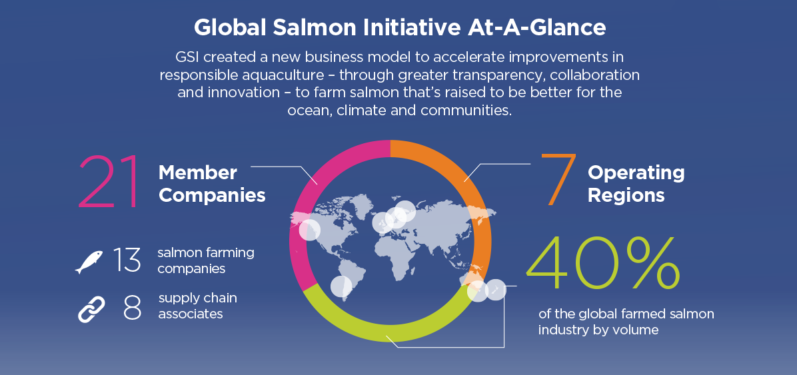
At a macro level, the question we’re asking is how we can develop a food system that provides the amount of healthy food we need while not destroying our planet. Salmon farming is not the only answer, but done right, it’s definitely part of the solution. GSI members are driven by their commitment to doing it right; GSI’s Sustainability Report has a vital role to play. It shows where and how we need to make improvements to meet our ambitious goals and ensure farmed salmon remains one of the most eco-efficient animal proteins.
Following are three key areas of focus, identified as priorities in our Sustainability Report over the last few years. We’re highlighting solutions we’ve already implemented through members’ collaborative efforts – as well as what’s next.
Innovating for Sustainable Feed
Like many industries, our success relies on the availability and high quality of our raw ingredients. In this case, these ingredients are what we use to feed our fish. To keep farmed salmon healthy and to replicate their natural diets, a major component of current feed formations comes from wild fish. While this resource provides all the natural nutrients salmon require, we recognize that we cannot continue using these resources at the same levels as demand grows. Therefore, we must find ways either to make these resources more efficient or find alternative sources to complement their use.
That is why we collaborate with industry feed companies to advance the sustainability of feed through:
- Improving feed ingredients and efficiencies to lower feed conversion ratio (FCR) (a measure of raw ingredients against outputs)
- Motivating the development of novel oils rich in omega-3s through the launch of a tender outlining industry needs
- Supporting the development of a feed-specific element of the ASC standard
- Encouraging uptake of circular approaches through the use of by-products
Already, the FCR has dropped to 1.2:1 OR 1.1:1 and is continually falling lower. Next, we will focus on:
- Staying at the forefront of feed innovation by supporting and incorporating further developments of novel omega-3 ingredients
- Sharing best practices to minimize waste
- Working closely with industry feed companies to improve the carbon footprint of our feed resources, which is currently the highest contributor to the sector’s overall footprint
- Ensuring all our feed is deforestation-free
- Working to achieve full ASC certification across our feed supplies
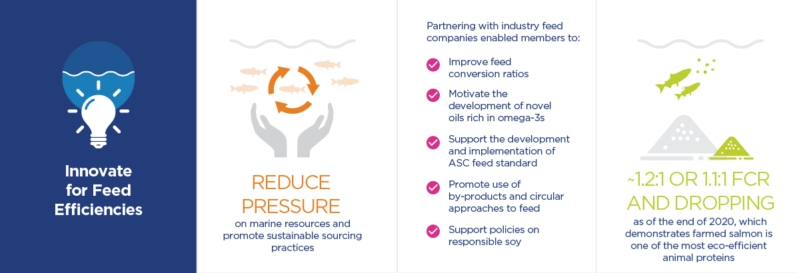
Promoting Optimal Animal Health and Welfare
Ensuring optimal fish health and welfare is critical for us as farmers – healthy fish mean healthy oceans and healthy people. Operating in a natural ecosystem means we are at risk of natural biosecurity challenges such as disease and sea lice. It is clear we can learn from each other on this topic, and we can accelerate the identification and implementation of strategies much more quickly by working together.
To support collaboration, we created an expert taskforce through which members:
- Shared knowledge on best practices
- Worked together to find solutions for common challenges
- Combined resources to conduct and review technological trials and new approaches
- Implemented scalable solutions for fish health and welfare
We implemented an effective knowledge-sharing platform to promote ongoing improvements in these areas, which so far have yielded a reduction in sea lice treatments and an increase in non-medicinal approaches to sea lice treatments. Next, we will focus on:
- Promoting the highest levels of fish health and welfare by working within leading industry welfare standards and continually assessing best practices
- Working with the industry supply chain, including pharmaceutical companies, to ensure any medicines in use are applied at highest efficacy
- Sharing knowledge on the latest innovations, such as AI technology that measures individual fish health, hydrodynamic modelling tools that monitor water currents and movement of possible pathogens, and reviewing smolt quality and functional feeds
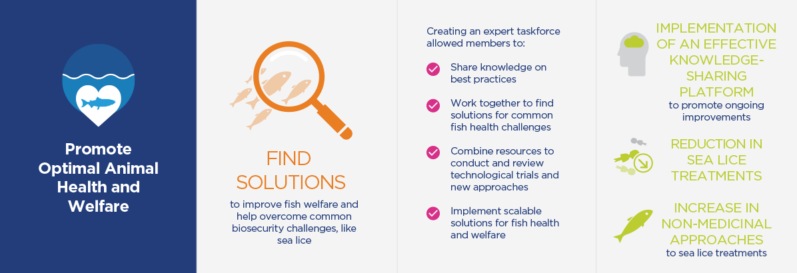
Reducing Antibiotics Use
To maintain optimal health and welfare, fish sometimes require medicine, including antibiotics. However, we are committed to decreasing the use of antibiotics and focusing our efforts on supporting the faster uptake of new, holistic approaches to disease management. To foster knowledge sharing and collaboration, we established an industry taskforce supported by external experts. Our members:
- Documented and assessed the current situation, including when and why antibiotics are used
- Shared best practices on antibiotics use as part of fish welfare programs
- Incorporated more holistic approaches to management
- Supported pharmaceutical R&D to accelerate development of new vaccines
These efforts have yielded a 60% reduction in average antibiotic use among GSI members since 2013 – and in some cases, have dropped all the way to zero use. Next, we will focus on:
- Working with the latest guidelines and best practices on antibiotic use as provided by expert organizations
- Running trials to assess best-practice approaches to antibiotic use as well as alternative approaches
- Supporting pharmaceutical R&D to provide alternative vaccines and the development of novel alternatives
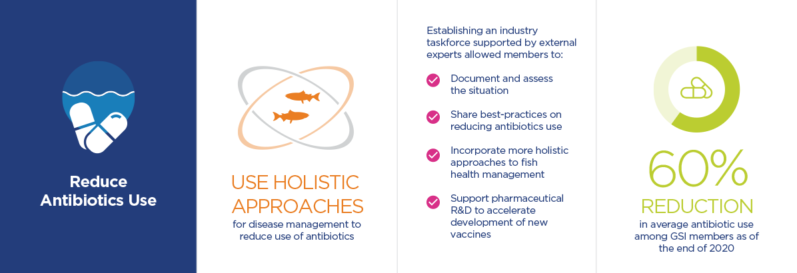
The Sustainability Report helps our members collectively and individually identify where we face challenges and where we can learn from one another. While we continue to make progress, there is still much to do. In the year ahead, we will continue to share best practices to reduce our environmental footprint across these focus areas, as they remain our most critical challenges.
At the same time, we acknowledge that our global climate is changing, and this will no doubt bring new challenges. It is therefore imperative that we consider how to further reduce our sector’s contribution to greenhouse gas emissions, which we are addressing through a new initiative in collaboration with World Wildlife Fund, as well as how we can work to improve our climate resilience.
Through the GSI model – embracing collaboration and transparency to identify and implement solutions to improve environmental performance – we believe we will be better positioned to drive change and deliver farmed salmon that is raised to be better for oceans, climate and communities.
To learn more about how we drive industry-wide improvements, see our new infographic on how we’re uniting private sector for sustainability transformations.
